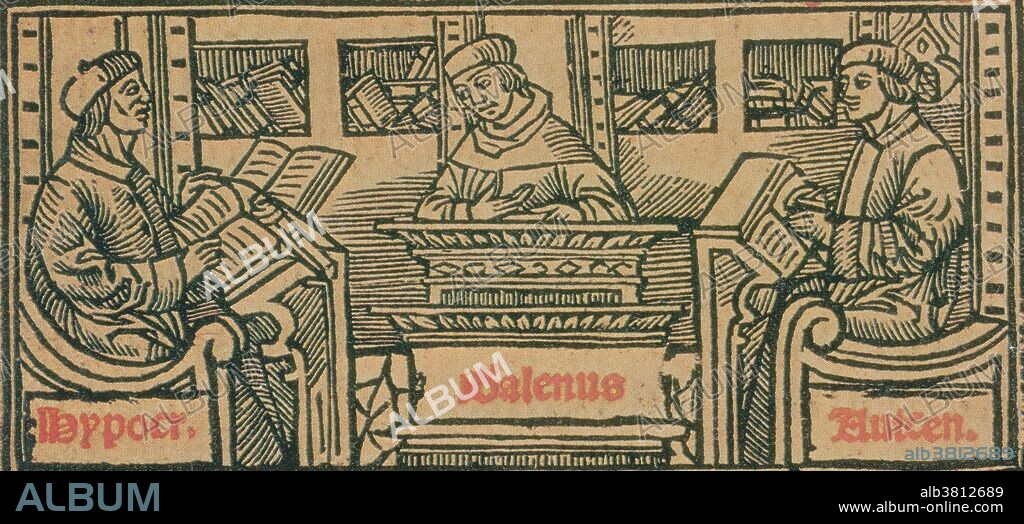alb3812689
Hippocrates, Galen, Avicenna, Ancient Physicians

|
Añadir a otro lightbox |
|
Añadir a otro lightbox |



¿Ya tienes cuenta? Iniciar sesión
¿No tienes cuenta? Regístrate
Compra esta imagen

Título:
Hippocrates, Galen, Avicenna, Ancient Physicians
Descripción:
Traducción automática: Hipócrates (460-370 a. C.), llamado "el padre de la medicina", fue un médico griego que sentó las bases de la medicina científica al liberar el estudio médico de las limitaciones de la especulación filosófica y la superstición. Tradicionalmente, pero de forma inexacta, se le considera el autor del juramento hipocrático. Galeno (131-201) fue un anatomista, médico y escritor griego cuyas teorías formaron la base de la medicina europea hasta el Renacimiento. Avicena, latinización del nombre de Ibn Sina (980-1037), filósofo y médico persa. (Nombre completo Abu Ali al-Husayn ibn Abd Allah ibn Sina al-Balkhi) Avicena fue un filósofo y médico árabe cuyos escritos filosóficos, que combinaban el aristotelismo con ideas neoplatónicas, influyeron enormemente en el escolasticismo, y cuya obra médica Qanun fue la más importante. influencia en la medicina medieval
Hippocrates, (460-370 BC), called "the Father of Medicine" was a Greek physician who laid the foundations of scientific medicine by freeing medical study from the constraints of philosophical speculation and superstition. He is traditionally but inaccurately considered the author of the Hippocratic oath. Galen (131-201) was a Greek anatomist, physician, and writer whose theories formed the basis of European medicine until the Renaissance. Avicenna, Latinization of name of Ibn Sina (980-1037), Persian philosopher and physician. (Full name Abu Ali al-Husayn ibn Abd Allah ibn Sina al-Balkhi) Avicenna was an Arab philosopher and physician whose philosophical writings, which combined Aristotelianism with neo-Platonist ideas, greatly influenced scholasticism, and whose medical work Qanun was the greatest single influence on medieval medicine.
Crédito:
Album / Science Source / New York Public Library
Autorizaciones:
Modelo: No - Propiedad: No
¿Preguntas relacionadas con los derechos?
¿Preguntas relacionadas con los derechos?
Tamaño imagen:
3564 x 1640 px | 16.7 MB
Tamaño impresión:
30.2 x 13.9 cm | 11.9 x 5.5 in (300 dpi)
Palabras clave:
131 • ANTIGUA GRECIA • ANTIGUO • ANTIGÜEDAD • ARABE • ARTE • AVICENA • CIENCIA • CURADOR • DIBUJO • EMPERADOR MARCO AURELIO • FAMOSO • FILOSOFO • GENTE • GRABADO EN MADERA • GRECIA ANTIGUA • GRIEGO • HISTORIA • HISTORICO • HOMBRE • HOMBRES • ILUSTRACION • IMPORTANTE • ISLÁMICO • MARCO AURELIO • MARCO AURELIO, EMPERADOR • MARCUS AURELIUS ANTONINUS • MARCUS AURELIUS • MASCULINO • MEDICINA • MEDICINAL • OBRA DE ARTE • PERSONA • PERSONALIDAD • PERSONALIDADES • PLANCHA DE MADERA • RETRATO DE HOMBRE • S. -II • S. X. • SIGLO XI • SIGLO-III • XILOGRAFIA
 Pinterest
Pinterest Twitter
Twitter Facebook
Facebook Copiar enlace
Copiar enlace Email
Email
